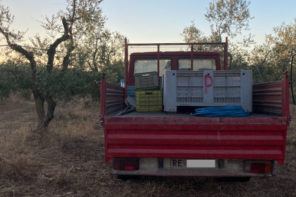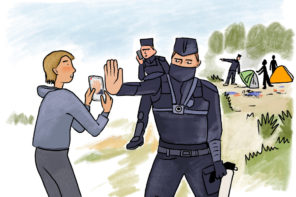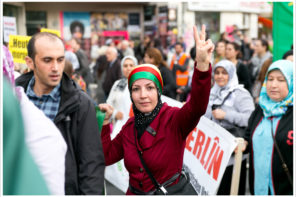The idea of the European Union as a partnership for peace, an experiment in post-national democracy, and an abode for human rights, has been subjected to a sobering reevaluation.
Two particular developments, each exemplifying broader trends, have been central to this fate. First, the resistance and the eventual surrender of the Greek government to the dictates of its creditors, and second, the growing tensions regarding the reception of asylum seekers and the place of immigrants in the EU. How is it that in today’s European Union, the political landscape is characterized by the increasingly brutal treatment of Europe’s own struggling populations and of migrants seeking its hospitality? Europe at a Crossroads, the first issue of a new online journal, Near Futures Online, is dedicated to addressing this question.
Near Futures Online is a companion of Zone Books’ series Near Futures edited by Wendy Brown and Michel Feher.
While Near Futures examines the impact of neoliberal thought on contemporary society, Europe at a Crossroads attends to the recent history and potential fate of European austerity politics and inhospitality toward immigrants.
It brings together scholars, journalists, political activists, and artists, and features contributions belonging to different genres and using a variety of media – essays and reportages, interviews and dialogues, photo essays, and videos. Its twenty-eight contributions are organized in three sections:
Perennial Austerity explores how — across the European territory — democratic and welfare principles have been replaced by creditworthiness and attractiveness to lenders. This section features the videos and the text of an extensive conversation between Yanis Varoufakis and Michel Feher. Drawing on the experiences of the Syriza governments (I and II), Varoufakis identifies the challenges to democratic change in the EU and argues for the creation of a pan-European movement for democracy – DiEM25 – for overcoming them. This section also includes interviews with Wolfgang Streeck on the emergence of “European Consolidation State,” Thomas Biebricher on the legacies of Ordoliberalism, and Claus Offe on the current political impasses of the EU. Powerful visual accompaniment to these entries is provided by Vincent Berthe’s photo-essay of austerity-stricken Thessaloniki, Greece, and Danae Stratou’s video-project showing the movement of people and the manipulation of the environment around Athens.
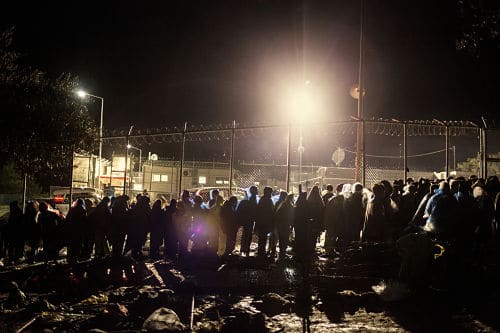
Lesvos. Greece. Oct. 25, 2015. The line to enter the Moria registration centre during a storm (Photo by Alessandro Penso)
Managed Inhospitality focuses on sanctioned xenophobia and the ordeal endured by asylum seekers in and around European territory. Two photo-essays by Alessandro Penso vividly demonstrate the struggles of refugees and immigrants across the two major routes towards western Europe: across the Mediterranean Sea and through eastern Europe. In a series of probing essays, a collective project by fifteen researchers elaborate the New Keywords of “the Crisis” in and of “Europe.” As part of this section, Charles Heller and Lorenzo Pezzani’s interactive essay shows that because of institutional inaction and policies of (non-)assistance in the Mediterranean, rescue operations by untrained and unequipped vessels and agents have increased fatality rates among the migrants. And Basak Yavcan discusses the consequences of the negotiations between the EU and Turkey, which aim to turn Turkish territory into a buffer zone for European immigration.
Trials of the Left analyzes the challenges and complicities of traditional left-leaning European political parties in the face of neoliberalization of the European Union. It also attends to the potentialities of the recent leftist social movement within and outside institutional politics. The interviews with Fabien Escalona and with Jean-Michel de Waele on social democracy in Europe, and the essay by David Bailey on the disappointment of social democratic parties in Europe, offer a critical appraisal of the fate of social democracy across the continent. Costas Douzinas takes on the experience of Syriza in Greece and reflects on the fate of the left in power, and Jeremy Gilbert analyzes the rise of Corbynism and its possible futures in the UK.
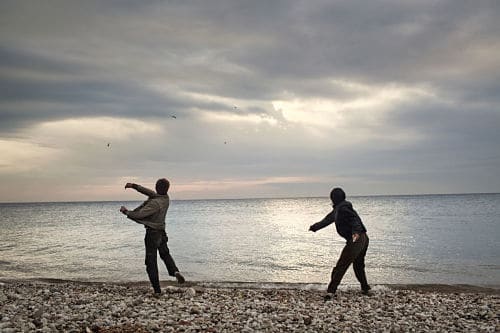
2012. Patras. Greece. Afghan boys throwing stones into the sea. They are waiting for the evening, when they will try to sneak into the port, where they hope to illegally board a ship bound for Italy. Patras is one of the main escape points from Greece, due to the numerous cargo ships that dock in the port and are bound for Italy. It is therefore one of the points where it is possible to attempt to escape from Greece (Photo by Alessandro Penso)
Europe at a Crossroads also offers a timeline that brings together the key moments of neoliberalization of Europe with key developments of immigration/refugee policies and left politics. In his introduction to the issue, The Critical State of the Union, Michel Feher argues that since the great recession of 2008 and the resulting sovereign debt crisis that shook several EU member-states in 2011, European policy-makers have responded by initiating austerity measures that they believed would facilitate economic recovery. The reasoning behind this action was that Europe’s prosperity, regardless of circumstances, ultimately depends on the attractiveness of its territory in the eyes of investors. However, governments that are beholden to investors find themselves in a difficult situation. They must convince their constituencies that the measures which placate financial markets – flexible labor, light taxes on capital gain, a lean public sector, and loosely regulated industry – are also in their own best interests.
They must do this despite the fact that these measures lead to precarious jobs, shrinking benefits, and bankrupt public institutions.
In this context, Feher points out, immigration has offered European government an expedient means of warding off accusations of neglect. EU officials have sought to demonstrate that, short of shielding their citizens from social and economic insecurity, they have remained capable of protecting them against a different peril – to wit, the demographic and cultural menace attributed to migrants.
Investing in border control and ramping up the deportation of undocumented foreigners has proved to be an expedient way for elected leaders to convey that they could still act on behalf of the people who had elected them.
In fact, representing immigration as a problem in need of tougher border control is now the main area of consensus among EU-member states.
The prevailing wisdom of the EU’s ruling elite and its apologists is that these policies represent the best, or even the only, possible response to external crises, such as the sovereign debt crisis and flow of refugees. That they are, in effect, necessary emergency measures. In this context, Europe at a Crossroads posits an argument – sustained by many of the scholars, activists, and artists featured in the issue – that the sorry state of contemporary Europe is due less to these allegedly external shocks and more to the way that the governing agencies of the European Union have interpreted and responded to them. The question then becomes – beyond identifying underlying causes and logics – what potential responses are there to these austerity and inhospitality programs? What possibilities does the near future hold for the European Union, and for the left’s ability to challenge its current priorities?
Featured image by Eric Fischer (flickr, CC BY 2.0)






